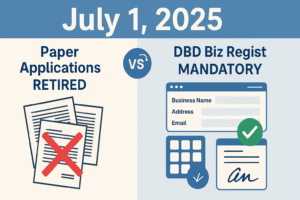Key takeaways
- There are various forms of business structures in Thailand that are available to foreign businesses.
- Joint ventures are popular for foreign businesses considering operating in Thailand.
- Foreign companies can take advantage of various government incentives, including Board of Investment Thailand privileges.
Thailand’s business-friendly environment
As one of South-East Asia’s largest economies, Thailand is quickly becoming a strategic destination for organisations that are considering expanding in the country and further across the region.
To maintain economic growth and a level of attractiveness for foreign investors, Thailand has various forms of structures that foreign businesses can utilise to begin operations in the country.
Business structures in Thailand
There are currently seven distinct types of business structures that foreigners can utilise in Thailand.
- Joint venture
- Partnership
- Branch office
- Regional office
- Limited company
- Sole proprietorship
- Representative office
Joint ventures
Joint ventures, commonly known as ‘JVs’, are incredibly popular for foreign investors in Thailand.
According to Section 5 of the Starting a Business in Thailand Ministry of Foreign Affairs Handbook, a JV is described as a group of persons (natural and/or juristic) entering into an agreement in order to carry on a business together.
If a JV in Thailand has a majority of foreign shareholders, it is essential that it is registered as a Foreign Business, and, in most cases, will need to open a branch in Thailand.
Partnerships
While not usually favoured by foreign investors, there exist three types of partnerships in Thailand.
- Unregistered partnerships
- Registered ordinary partnerships
- Limited partnerships
Branch office
Favoured by foreign financial institutions, utilising a branch office structure allows foreign businesses to establish their presence in the country, while maintaining full ownership.
Companies utilising a branch office structure must ensure that they are bringing in THB 5m working capital in a foreign exchange within certain intervals over a five-year period.
Regional office
Before setting up a regional office in Thailand, the foreign company must also possess at least one active branch in Asia.
It is necessary that a Foreign Business Licence is granted to those organisations wishing to open a regional office in Thailand.
To ensure that the regional office satisfies the law, the office must not:
- Derive income from its operations
- Accept or make a sales offer
- Negotiate or enter into agreements with other companies in Thailand
Limited company
There exist two types of limited company in Thailand, namely private or public companies. Private companies are governed by Thailand’s Civil and Commercial Code, while the Public Company Act governs public companies.
Private limited companies are the most popular vehicle for company incorporation in Thailand. To ensure compliance with the law, they must have a minimum of seven shareholders. A private limited company may also be wholly-owned by foreigners, depending on the company’s activities.
Sole proprietorship
Sole proprietorship is owned by one person with unlimited liability.
As sole proprietorship is limited to a small minority of foreigners (Americans covered under the United States-Thailand Treaty of Amity) it is not widely utilised.
Representative office
A representative office is an entity of a foreign business which is located in Thailand and trades across various countries.
Similar to the regional branch structure, a representative office must not engage in any profit-making activities.
What are the restrictions on foreign ownership?
There are various restrictions on foreign ownership in Thailand, however, foreign companies can look to employ a joint venture structure to ensure they remain compliant with the various laws.
Additionally, there are other methods that can be utilised to achieve 100% foreign ownership of a company in Thailand, including:
- Obtaining a Foreign Business Licence
- Under the Foreign Business Act (FBA), investors can potentially be granted a Foreign Business Licence, if the business falls under List 3 of the FBA.
- Utilising Board of Investment Thailand (BOI) privileges
- To attract further investment into the country, Thailand provides incentives to businesses via the BOI, a Thai government agency tasked with promoting investment.
- To see an authorised list of the eligible activities, please review the BOI’s Investment Promotion Guide.
- The Treaty of Amity
- This is only available to citizens of the United States of America.
How can WSR international help your business?
As can be seen throughout this article, there are various forms of business structures that foreigners can consider when looking to incorporate a business in Thailand.
With business and legal experts located in both Bangkok and Phuket, WSR International are perfectly situated to assist you.
If you would like to discuss the contents of this article in further detail, please do not hesitate to reach out to the business and legal experts at WSR International.
𝗖𝗼𝗻𝘁𝗮𝗰𝘁 𝘂𝘀:
WSR International Co., Ltd.
Chartered Square Unit 16-05, 152 North Sathorn, Khwaeng Silom, Khet Bang Rak, Bangkok 10500 VAT Registration no: 0905565001881
Phone: +66 92 616 4423
Email: info@wsrlawgroup.com








